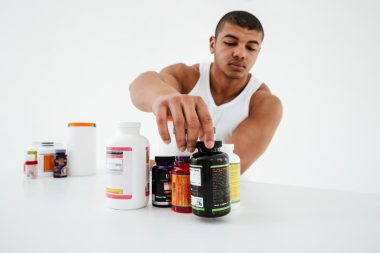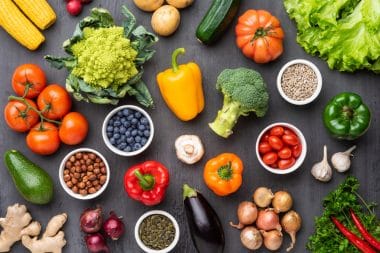Many of the macro-nutrient diets currently in favor are rooted in the consumption of plentiful amounts of protein. This has left many of us asking, how much protein should we be eating each day? Whether your protein comes from a slab of red meat or a high quality protein supplement how much do we really need? Here we will delve into the world of protein and discuss how much is really needed each day and how to best get it.
How Much Protein is Enough?
The amount of food needed each day from the protein food group depends upon factors such as how old you are and how active you are. Most Americans consume plenty of protein, but most could make better choices in the types of proteins they eat. Children’s protein needs are generally in the 2 — 6 ounce range, depending upon their age and level of activity. Adults fall into a range of around 5 — 6.5 ounces. A rule of thumb is that the average adult needs around 0.8 grams of protein per kilogram of bodyweight a day. Generally, 1 ounce of meat, poultry or fish, ¼ cup cooked beans, 1 egg, 1 tablespoon of peanut butter, or ½ ounce of nuts or seeds is considered a 1 ounce-portion of protein.
Is There Such a Thing as Too Much Protein?
In the most recent “What We Eat In America” report put out by the US Department of agriculture, the average American male 20 or older consumes an average of 98.9 grams of protein a day, and women over 20 eat 68 grams on average. Is this too much protein?
While the research on this topic is conflicting, there are some signs that we are eating too much protein. The first sign many people experience is unexpected weight gain. If you are eating well and getting plenty of exercise, unexpected weight gain might be a sign your protein intake is too high. If you are showing signs of dehydration or constantly feel thirsty it may also be a sign of too much protein. The more protein you eat the more water your body needs to flush it through your kidneys. A more serious potential outcome of too much protein is difficulty with the kidneys, however the jury is still out on this. None of the current studies strongly caution against too much protein, however it is best to stay as close to the recommendation as possible.
Protein Guidelines for Women:
How much protein American women need depends upon a number of factors. Things like age, activity level and current overall health will impact your protein needs. For example, a 25-year-old woman who is in good health and exercises five times a week will need around 170 grams of protein. While a 75-year-old woman who is mostly sedentary will need around 100 grams. By paying attention to your needs based upon your age and health, you can make sure you are giving your body the fuel it needs to stay healthy.
Protein Guidelines for Men:
Like women, the guidelines for how much protein men need are dependent upon several factors. At 25, in excellent health you will need upwards of 245 grams of protein for optimum health. A man who is 75 and largely sedentary would need just 129 grams. The Institute of Medicine recommends that all men, regardless of activity level, consume at least 56 grams of protein every day.
For both men and women working to build muscle mass through weight training, higher levels of protein will be needed. In order for the body to add muscle mass, you will need to put more in to get more out. For example, the Academy of Nutrition and Dietetics reports that men need 1.4 to 1.8 grams of protein per kilogram of body weight each day to build muscle mass.
Are My Protein Needs the Same as a Vegetarian or Vegan?
While your source of protein will differ from non-vegetarians, vegans and vegetarians should shoot for the same range of 5 — 6.5 ounces of protein daily. This protein can come from a variety of foods, such as vegan protein supplements, eggs (for non-vegans), beans and peas, nuts, nut butters, and soy products, like tofu or tempeh.
Best Sources of Protein
While the list of proteins goes on almost endlessly, not all protein sources are created equal. For non-vegetarians, leaner cuts of meat like chicken breast and pork are great ways to up your protein. Vegetarian and vegan protein options include many different plant-based foods. Some of these include high protein beans, nuts high in omega-3’s, vegan protein supplements, nut butters, peas, and soy products like miso, edamame, tofu, tempeh, soy nuts and soy sauce. For non-vegans, milk products and eggs are also good protein sources.
Daily Protein Intake Calculators:
Interactive Dietary Reference Intakes for Adults
BodyBuilding.com Target Protein Intake Calculator
Understanding your requirements for protein will help ensure that your body gets what it needs to reach your health goals. Protein needs vary depending upon age, gender, activity level and health goals. That being said, there are minimal levels that all men, women and children need to function at their best. By following these guidelines you can maintain the health and wellness of your body and mind.








Reply